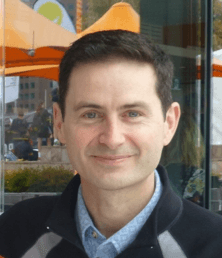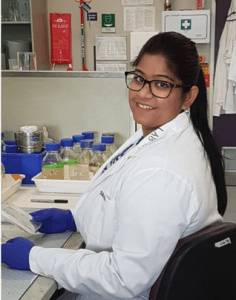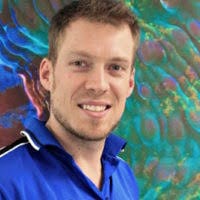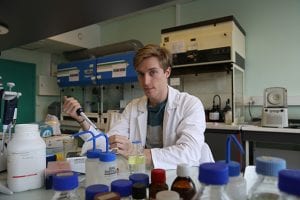People
EMRI Director
Professor Linda Blackall, Faculty of Science – School of BioSciences and School of Earth Sciences
Academics
Much of EMRI research is multi-disciplinary with Lead Academics located in their domain-specific home faculties.
- Faculty of Science
EMRI investigators are in the Schools of BioSciences, Earth Sciences, and Mathematics and Statistics. Michelle Ward, provides Administration and Support from the Faculty of Science.
Alex Andrianopoulos, School of BioSciences
Jillian Banfield, School of Earth Sciences
Linda Blackall, School of BioSciences and School of Earth Sciences
Douglas Brumley, School of Mathematics and Statistics
Mike Duffy, School of BioSciences and Honorary at Royal Melbourne Hospital
Ralf Haese, School of Earth Sciences
Ary Hoffman, School of BioSciences
Alexander Idnurm, School of BioSciences
Alex Johnson, School of BioSciences
Kim-Anh Lê Cao, School of Mathematics and Statistics
Michael McCarthy, School of BioSciences
John Moreau, School of Earth Science
Laura Parry, School of BioSciences
Ute Roessner, Head of School, School of BioSciences
Robyn Schofield, School of Earth Sciences
Madeleine van Oppen, School of BioSciences
Heroen Verbruggen, School of BioSciences
Peter Vesk, School of BioSciences
- Faculty of Veterinary and Agricultural Science
EMRI investigators are in the School of Agriculture and Food. Many are in the Centre for Healthy Soils for Sustainable Food Production and Environmental Quality, whose manager is Dr Ee-Ling Ng.
Deli Chen, School of Agriculture and Food
Jim He, School of Agriculture and Food
Kate Howell, School of Agriculture and Food
Hang-Wei Hu, School of Agriculture and Food
Herbert Kronzucker, School of Agriculture and Food
Ee-Ling Ng, Centre Manager
Tony Weatherley, School of Agriculture and Food
- Faculty of Medicine, Dentistry and Health Sciences
EMRI investigators are in the School of Biomedical Sciences, (Dept of Microbiology and Immunology, Dept of Biochemistry and Molecular Biology, Melbourne Diagnostics Unit), the Melbourne Dental School and Melbourne Advanced Microscopy. They are located in the Peter Doherty Institute, Bio21 and the Melbourne Dental School.
Sammy Bedoui, Department of Microbiology and Immunology
Andrew Brooks, Department of Microbiology and Immunology
Dieter Bulach, Department of Microbiology and Immunology
Stuart Dashper, Melbourne Dental School
Mark Davies, Department of Microbiology and Immunology
Zoe Dyson, Department of Biochemistry and Molecular Biology, Bio21 Institute
Eric Hanssen, Department of Biochemistry and Molecular Biology and Advanced Microscopy Facility, Bio21 Institute
Kathryn Holt, Department of Biochemistry and Molecular Biology, Bio21 Institute
Ben Howden, Molecular Diagnostics Unit, Peter Doherty Institute
Stephan Kaiser, Administration Support, Department of Microbiology and Immunology
Andre Mu, Peter Doherty Institute
Hayley Newton, Department of Microbiology and Immunology
Timothy Stinear, Department of Microbiology and Immunology
Dick Strugnell, Department of Microbiology and Immunology
Karena Waller, Department of Microbiology and Immunology
- Faculty of Engineering
EMRI investigators are in the Melbourne School of Engineering – School of Chemical and Biomedical Engineering and School of Electrical, Mechanical and Infrastructure Engineering (Department of Infrastructure Engineering)
Sally Gras, Chemical and Biomedical Engineering
Anne Steinemann, Infrastructure Engineering
Geoff Stevens, Chemical and Biomedical Engineering
Michael Stewardson, Infrastructure Engineering
Andrew Western, Infrastructure Engineering
- Faculty of Arts
EMRI investigators are in the Grimwade Centre for Cultural Materials Conservation.
Caroline Kyi, Grimwade Centre
Robyn Sloggett, Grimwade Centre
Researchers
- Postgraduate Researchers
Courses, seminars are run for Graduate Researchers by Professional Development for Graduate Researchers.
EMRI Funded
 Mr Francesco Ricci (2018-2021) (riccif@student.unimelb.edu.au)
Mr Francesco Ricci (2018-2021) (riccif@student.unimelb.edu.au)- Supervisors: Dr Heroen Verbruggen, Prof Linda Blackall, Prof Michael Kühl (University of Copenhagen, Denmark).
- Project Title: Physicochemical micro-niches in the coral skeleton and their relation to the microbiome
- Brief Description: I investigate the micro-niches within the calcium carbonate skeleton of scleractinian (stony or hard) corals, using planar optode imaging to analyse their physicochemical properties and molecular techniques to characterise the associated microbiota.
 Mr Heyu Lin (2018-2021) (heyu.lin@student.unimelb.edu.au)
Mr Heyu Lin (2018-2021) (heyu.lin@student.unimelb.edu.au)- Supervisors: Dr John Moreau, Assoc Prof Kat Holt
- Project Title: Investigating the potential for mercury methylation by marine micro aerophilic bacteria
- Brief Description: This project will employ culturing-based and culture-independent techniques to understand the mechanisms for microbial mercury methylation in aerobic marine water columns. We will be looking for new genes and pathways employed by marine bacteria to metabolize or resist anthropogenic mercury contamination, in order to investigate the role of bacteria in the marine biogeochemical mercury cycling.
EMRI Affiliated Postgrads
 Ms Evelyn Chou (2014-2018) (echou@student.unimelb.edu.au)
Ms Evelyn Chou (2014-2018) (echou@student.unimelb.edu.au)- Supervisors: Prof Karen Day, Dr Michael Duffy
- Project Title: Characterization and mechanisms of a novel density-dependent death phenotype in Plasmodium falciparum
- Brief Description: I explore quorum sensing in the malaria parasite Plasmodium falciparum, a form of cell-cell communication in which unicellular organisms count themselves through the secretion and reception of signaling molecules. Responses to quorum sensing can include the production of inhibitory factors that prevent or reduce growth and proliferation. P. falciparum parasites are temporally exposed to conditions of high parasite density during sequestration in the microvasculature, providing the ideal environment for density-dependent differential behavior. I show that P. falciparum undergoes density-dependent cell death characterized by changes in parasite gene expression that are associated with sexual stage transmission, programmed cell death and clonal variation (a key regulator of infection and host interaction). I also combine cellular and molecular biology, biochemistry, metabolomics, functional genomics, and bioinformatics to identify and understand the mechanisms underlying these responses.
 Ms Allene Macabuhay (2018-2022) (amacabuhay@student.unimelb.edu.au)
Ms Allene Macabuhay (2018-2022) (amacabuhay@student.unimelb.edu.au)- Supervisors: Prof Ute Roessner, Assoc Prof Alex Johnson, Prof Michelle Watt (Forschungszentrum Jülich, Germany), Dr. Borjana Arsova (Forschungszentrum Jülich, Germany)
- Project Title: The role of lipids in the formation of beneficial interactions between plant roots and soil microbiota under heat stress
- Brief Description: The plant root-soil microbe interface is a major frontier with potential opportunities for addressing crop agricultural challenges, especially under abiotic stress. This study will harness specific plant growth promoting soil microbes and demonstrate their beneficial effects using the model plant, Arabidopsis thaliana, under heat stress. In particular, we aim to investigate the biochemical nature of the plant-microbe interaction, focusing on lipids as key signalling molecules, and explore how temperature under predicted global warming scenario will impact this interaction using high-throughput shoot and root phenotyping platforms and state-of-the-art lipidomics technologies.
 Zhenzhen Yan (2017-2021) (zheny2@studnt.unimelb.edu.au)
Zhenzhen Yan (2017-2021) (zheny2@studnt.unimelb.edu.au)- Supervisors: Dr Hang-Wei Hu, Prof Jim (Jizheng) He
- Project Title: Understanding the Core Resistome and Microbiome in Urban Environment
- Brief Description: Gaol: Identify the core resistome and core microbiome (the most common and ubiquitous antibiotic resistance genes and bacterial phylotypes) in urban environment. Explore factors that shape the microbial community structure and impact on resistome in urban environment.
 Chaoyu Li (2017-2021) (chaoyul@student.unimelb.edu.au)
Chaoyu Li (2017-2021) (chaoyul@student.unimelb.edu.au)- Supervisors: Prof Jim (Jizheng) He, Dr Hang-Wei Hu, Prof Deli Chen
- Project Title: Understanding the role of the newly-discovered comammox bacteria to nitrification in terrestrial ecosystems
- Brief Description: A recent discovery found that the complete ammonia oxidizers within the Nitrospira genus are capable of converting NH3 to NO3- in a single organism. It was called “comammox Nitrospira”. This project will assess the environmental prevalence and functional importance of comammox Nitrospira, and to re-evaluate the relative contribution of comammox Nitrospira and canonical nitrifiers to nitrification in terrestrial ecosystems.
-18nlw0u-209x300.jpg) Yujing Zhang (2015-2019) (zhangy15@student.unimelb.edu.au)
Yujing Zhang (2015-2019) (zhangy15@student.unimelb.edu.au)- Supervisors: Prof Jim He, Prof. Deli Chen, Dr Hang-Wei Hu
- Project Title: Transmission of antibiotic resistance genes (ARGs) in Agro-ecosystems.
- Brief Description: Investigate the abundance, diversity and transmission potential of ARGs in various animal manures and Australian agro-ecosystems. Explore the major routes for transmission of ARGs from the rhizosphere to vegetables grown in soils.
 Mr Marcos Yianis Voutsinos (mvoutsinos@student.unimelb.edu.au)
Mr Marcos Yianis Voutsinos (mvoutsinos@student.unimelb.edu.au)- Supervisors: Dr John Moreau, Prof Jillian Banfield (Univ Melbourne, Univ California, Berkeley, USA)
- Project Title: Geomicrobiology of rare earth elements
- Description: The project aims to discover novel microbial compounds that liberate rare earth elements and phosphorus from minerals. By focusing on the interactions between soil microorganisms and lanthanide-phosphate minerals, this proposal seeks to understand how microbes break down these highly insoluble secondary minerals in the environment. Expected outcomes include new strategies for accessing phosphorus in depleted agricultural soils and recovering lanthanides from currently uneconomical mine tailings. This project will provide new knowledge of the microbially-controlled processes mediating the biogeochemical cycling of phosphorus and lanthanides in nature, for harnessing to improved land management and economical resource extraction.
 Mr Angus Keillar (2016-2020) (rkeillar@student.unimelb.edu.au
Mr Angus Keillar (2016-2020) (rkeillar@student.unimelb.edu.au- Supervisors: Dr Jay Black, Dr John Moreau, Dr Andre Mu
- Project Title: Understanding microbial responses to supercritical CO2 stress, and the implications for CO2 geosequestration
- Description: In this research, we will use a high-pressure and temperature experimental apparatus to simulate geological conditions at 1-2 km below the Earth’s surface, where supercritical carbon dioxide will be stored in large plumes that may trigger microbial metabolic responses with consequence for aquifer geochemistry and mineralogy. Specifically, we are interested in the viability of microbial biofilms that might help trap or limit the migration of subsurface supercritical carbon dioxide plumes.
 Mr Farhad Shafiei (2018-2021) (fshafiei@student.unimelb.edu.au)
Mr Farhad Shafiei (2018-2021) (fshafiei@student.unimelb.edu.au)- Supervisors: Dr Mathew Watts, Dr John Moreau, Dr Berin Boughton
- Project title: Determining microbial community structure and metabolic pathway changes in a thiocyanate biodegradation system under environmental perturbations
- Description: This project will examine how bioreactor microbial communities self-structure and metabolise thiocyanate and intermediation breakdown products during thiocyanate bioremediation of mining wastewater. We are particularly interested in resolving the species-dependent metabolic “handoffs” of nitrogen, sulfur and carbon, with broader implications for these biogeochemical cycles in both industrial-scale bioremediation systems and natural aqueous environments.
 Ms Ashley Dungan (2017-2020) (adungan@student.unimelb.edu.au)
Ms Ashley Dungan (2017-2020) (adungan@student.unimelb.edu.au)- Supervisors: Prof Linda Blackall, Prof Madeleine van Oppen
- Project Title: The exploration of bacterial probiotics in the model organism Exaiptasia pallida to increase climate resilience in corals
- Brief Description: The goal of my research is to develop a probiotic to mitigate the effects of thermal stress in E. pallida by understanding the phenotypic and genetic traits of their symbiotic bacteria and how these bacteria might neutralize toxic reactive oxygen species. I use pure culturing techniques, fluorescence in situ hybridisation, whole genome sequencing, metabarcoding, and physiological assessment of the anemone host to answer my questions.
 Ms Katarina Damjanovic (2015-2019) (kdamjanovic@student.unimelb.edu.au)
Ms Katarina Damjanovic (2015-2019) (kdamjanovic@student.unimelb.edu.au)- Supervisors: Prof Linda Blackall, Prof Madeleine van Oppen
- Project Title: Manipulating prokaryotic symbionts to enhance coral tolerance to stress
- Brief Description: This project consists in exploring the feasibility of manipulating the coral prokaryotic microbiome by targeted exposures into the laboratory and gaining insights into the transmission mode of bacteria and Symbiodinium in corals with different reproductive strategies.
 Miss Giada Tortorelli (2017-2020) (gtortorelli@unimelb.edu.au)
Miss Giada Tortorelli (2017-2020) (gtortorelli@unimelb.edu.au)- Supervisors: Prof Geoff McFadden, Prof Madeleine van Oppen, Prof Simon Davy (Victoria University of Wellington, New Zealand)
- Project title: Dissecting the symbiotic partnership between algae and animals that powers coral reefs
- Brief description: I am interested in the really initial steps during the establishment of symbiosis between Cnidaria and Symbiodinium. My main aim is to dissect the inter-partner molecular signalling that allows recognition between host and photosymbionts in the setup of symbiosis.
 Mr Leon Hartman (2016-2020) (leon.hartman@unimelb.edu.au)
Mr Leon Hartman (2016-2020) (leon.hartman@unimelb.edu.au)- Supervisors: Prof Linda Blackall, Prof Madeleine van Oppen, Prof Damien Hicks (Swinburne University of Technology)
- Project Title: Manipulation of prokaryotic communities in the coral model organism: Exaiptasia pallida
- Brief Description: We are establishing Australia’s first cultures of the coral model organism, E. pallida, and characterising its prokaryotic communities. Having access to this model and its baseline microbiome data will facilitate investigation of coral bleaching mitigation strategies, particularly inoculation with probiotic bacteria, which is the focus of my work.
 Mr. Alex Jaimes Castillo (2016-2020) (ajaimescastillo@swin.edu.au)
Mr. Alex Jaimes Castillo (2016-2020) (ajaimescastillo@swin.edu.au)- Supervisors: Prof Linda Blackall, Dr Tony Weatherley,
Dr Daniel Eldridge, Dr Bita Zaferanloo (Swinburne University of Technology)
- Project Title: Microbial Ecology of Urban Organic Waste Treatment (Compost).
Description: My research focuses on the identification of prokaryotic microorganisms during the composting of food waste. To accelerate the composting process, an eco-efficient in-vessel composter called "Cylibox" was developed, which provides optimal conditions for microbial activity, where endogenous heating increases the temperature above 65°C, which pasteurises the compost. The active phase of composting only takes nine days and the curing phase finishes in two months. After the metagenomic analysis, we found the tendency of the compost microbiome. The active phase of composting is dominated by Firmicutes and Proteobacteria, in contrast, Bacteroides have greater abundance in the curing phase. Hence, the mature compost is safe and of good quality, ready to be applied in the soil for sustainable agriculture or gardening.
 Ms. Sneha Gupta (2016-2019) (snehag@student.unimelb.edu.au)
Ms. Sneha Gupta (2016-2019) (snehag@student.unimelb.edu.au)- Supervisors: Prof Ute Roessner, Assoc Prof Penelope Smith (La Trobe University, Victoria, Australia), Dr. Siria Natera
- Project Title: The effect of salt stress on below ground biology
- Brief Description: This project aims to study the root-soil-microbe nexus which includes the spectrum of relationships between plant and microbes that span from pathogenic to mutually beneficial. With the focus on salinity stress, we will be able to add new understanding to this complex landscape investigating the chemical dialogue of these interactions along with the information on colonization of beneficial microbes specifically Trichoderma harzianum T-22 into roots under one of the greatest abiotic stresses, salinity, affecting agricultural production worldwide. This will be achieved by deploying biochemical analysis that will reveal information on chemical statement on these interactions, using various high-end metabolomics tools.
 Mr Martino Schillaci (2017-2021) (mschillaci@student.unimelb.edu.au)
Mr Martino Schillaci (2017-2021) (mschillaci@student.unimelb.edu.au)- Supervisors: Prof Ute Roessner, Assoc Prof Penelope Smith (La Trobe University, Victoria, Australia), Prof Michelle Watt (Forschungszentrum Jülich, Germany), Dr Borjana Arsova (Forschungszentrum Jülich, Germany)
- Project Title: The Impact of beneficial Microbes on Root Architecture and Metabolism of the Model Grass Brachypodium distachyon grown under non-optimal Temperatures
- Brief Description: During my PhD I will investigate the interaction between Brachypodium distachyon and the plant growth promoting bacterium Azospirillum brasilense at sub-optimal temperatures. In particular, I am focusing on the effect of bacterial colonization on Brachypodium's roots phenotype, transcriptome, proteome and metabolome at different time points. The aim of my project is to study which metabolic pathways are mainly influenced during the plant-bacterium interplay at various temperature scenarios.
 Ms Michela Winters (2018-2022) (mwinters@student.unimelb.edu.au)
Ms Michela Winters (2018-2022) (mwinters@student.unimelb.edu.au)- Supervisors: Dr Kate Howell, Prof Rudi Appels (Murdoch University), Assoc Prof Nils Arneborg (University of Copenhagen, Denmark)
- Project Title: Community ecosystems in food and beverage fermentations: the role of yeasts in quorum sensing in mixed culture fermentations.
- Brief Description: This project will investigate the phenomenon of quorum sensing in Saccharomyces cerevisiae with the overall goal of providing an understanding of the interactions between different microbial species during food and beverage fermentations.
 Ms Di (Echo) Liu (2016-2020) (dil4@student.unimelb.edu.au)
Ms Di (Echo) Liu (2016-2020) (dil4@student.unimelb.edu.au)- Supervisors: Dr Kate Howell, Prof Deli Chen, Dr Pangzhen Zhang
- Project Title: Microbial Terroir: Understanding the importance of the soil microbial community to Australian winemaking
- Brief Description: This project aims to examine microbial terroir as a crucial factor of wine terroir, which describe the regional variation in grape and wine quality characteristics. Investigate soil-borne community across multi-scale viticultural zones in Victoria to validate microbial biogeography associated with local climate, geography, and soil properties. Identify key taxa for microbial biogeography and wine characteristics. Explore potential translocation of soil-borne microbes to grapevines. In doing this, we expect to quantify wine terroir and provide new insights to agriculture management.
- Postdoctoral and Early Career Researchers
 Dr Patrick Buerger (2017 – 2020) (patrick.buerger@unimelb.edu.au)
Dr Patrick Buerger (2017 – 2020) (patrick.buerger@unimelb.edu.au)- Collaborators: Prof Madeleine van Oppen, Dr John Oakeshott (CSIRO, Canberra), Dr Owain Edwards (CSIRO, Canberra)
- Project Title: Enhancing the thermal tolerance of coral algal symbionts through genetic engineering.
- Brief Description: My research project is focused on climate change and anthropogenic impacts on coral reef ecosystems. Using genetic engineering and a range of Omics techniques, Patrick leads investigations into the thermal resilience of algal symbionts in corals.
- Current Supervision: Master of Science student Ms Ruby Vanstone (Univ Melbourne).
 Dr Robert Walker (2018-2021) (walker.r@unimelb.edu.au)
Dr Robert Walker (2018-2021) (walker.r@unimelb.edu.au)- Collaborators: Prof Ute Roessner.
- Potential Collaborations: Legume/rhizobia research groups at University of California Los Angeles and Western Australian institutions.
- Project Area: Plant microbe interactions.
- Brief Description: My research focuses on endophytic, symbiotic and rhizospheric microorganisms and their role in enhancing plant growth by exploring mechanisms involved in increased nutrient uptake, soil health, plant defence priming and plant and microbial biochemical interactions. By understanding the synergistic relationships between not only plant and microbial communities but also exudates and microbial compounds, I seek to harness beneficial plant growth-promoting microbes to build on and improve agricultural practices in the face of substantial global food security risks.
 Dr Wing Yan Chan (2019 – 2023) (wingc4@student.unimelb.edu.au)
Dr Wing Yan Chan (2019 – 2023) (wingc4@student.unimelb.edu.au)- Collaborators: Prof Madeleine van Oppen, Dr John Oakeshott (CSIRO, Canberra), Dr Owain Edwards (CSIRO, Canberra), Dr Manuel Aranda (King Abdullah University of Science and Technology, Saudi Arabia
- Project Title: Enhancing coral climate resilience via bio-engineering of algal endosymbionts
- Brief Description: My research focuses on bio-engineering of coral-associated algal endosymbionts to enhance coral climate resilience and success of coral reef conservation programs.
- Current Supervision: Master of Science student Ms Sarah-Jane Tsang Min Ching (University of Melbourne).
 Dr Justin Maire (2019-2023)
Dr Justin Maire (2019-2023)- Collaborators: Prof Madeleine van Oppen, Prof Linda Blackall, Dr Stephen Kidd (Univ Adelaide).
- Project Title: Bio-engineering of prokaryote symbionts of corals.
- Brief Description: I will conduct research on the bio-engineering of prokaryote symbionts of corals with the aim to increase their own and the coral holobiont’s thermal tolerance, possibly via a probiotic treatment, or genetic engineering of maternally transmitted prokaryote symbionts.
- EMRI Visiting Scientists